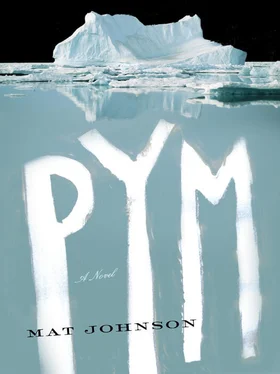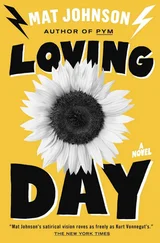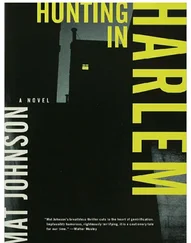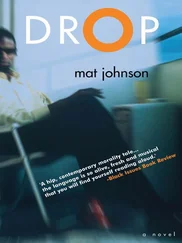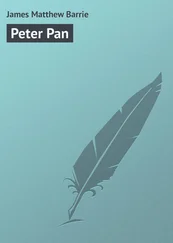“Yeah, but Karvel’s got some guns. We’ll do what we have to do to defend ourselves.”
“No, the snow monkeys,” Garth said, pointing. I followed his gloved digit out onto the snow-covered plain. And there, past a ridge not far from the direction I recognized we too had come from only weeks before, I saw them as well. An army of a hundred or more pale, shrouded figures, camped out. Rough igloos constructed in a circular formation. I didn’t know how long they had been there, but I did know why they were there. They had come for us.
“But then why so many, dog? If they’re just hunting us down, why bring an army when one could kick our collective black ass?”
* Unfortunately, the greener than green grass that surrounded our little three-fifths house, so mossy and moist beneath our feet, took its brilliance from a different source: it was fed by the runoff of the BioDome’s septic system.
† Scrapbooking, her husband told me.
WE wasted a lot of time just getting Karvel to believe what we were saying: that they existed, that they were out there, that they had come. It was only because we were so relentless, and because the painter started to respond to our fear with ample fear of his own, that Karvel finally relented and agreed to at least see what had made us so excited.
“Nobody’s busting in my dome, I’ll tell you that right now. That’s where I draw the line. I didn’t come all the way down here to get bushwhacked by some mythological creatures.”
To protect himself from being exposed to even a room that had been tainted by the outside air, Karvel insisted on wearing protective gear before entering the work area behind his grand illusion. I think he would have preferred a space suit, something airtight with its own supply of oxygen. In lieu of that, however, Karvel settled for a beekeeper’s suit because it covered his body completely, particularly his head. It seemed the BioDome was originally intended to house a hive population as well, for the purposes of pollination and honey production.
“I like honey, hell, I love it. But I don’t like bugs. I like butterflies, we got lots of them. And ladybugs.” Karvel nervously chattered as he dressed. It was clear during our ascent to Mrs. Karvel’s little room that Thomas Karvel rarely ventured behind the set of his own masterpiece. If ever. Garth and I, the recent visitors, the newly arrived guests, had to direct him through the scaffolding to navigate the place. His whole time back there Karvel wore a look of mild disgust, as if he was being forced to peer into the putrid bowels of his beloved. When we finally found our way back to Mrs. Karvel’s poisonous little storage room up high, a wave of floral air freshener greeted us. Its spray was so recent and heavy that the smell of ozone hung nearly as heavily as the ones of weed and nicotine beneath it. Nobody bothered to mention these aromas, of course, because now there was something far more disturbing in the room than rat bait. A cache of rifles was leaning against the far wall. Mrs. Karvel was vigorously polishing the largest of them.
“Honey,” the painter asked. “Did you see anything funny out—”
“I’m not looking out there, Tommy. You’re looking out there. You look out there, and you deal with it,” Karvel’s wife interrupted him, rubbing the oil cloth down the shaft as if she thought a genie might come out. There was a scope on the camouflage hunting rifle in her hand, and for the moment she had no problem looking through that, her bloodshot eye engorged and magnified on the other side. Satisfied with its cleanliness, Mrs. Karvel handed it to me firmly. I took it to the window, looked down the gun’s sight to the place of interest below.
“There,” I said, looking up from the weapon, calling Karvel over to take my place. “There” were the igloos. “There” were the tracks in the snow. Even through his beekeeping helmet, Karvel could make that out, or at least something out.
“Oh boy. Yup. I see something.”
“Shoot ’em!” his wife yelled. Though she wasn’t getting any closer to the window, Mrs. Karvel threw me another hunting rifle from where she was standing. I handed it to Garth, so she threw me another one.
“Look, I take care of in here. I always have taken care of in here, in our home. And you’re supposed to take care of what’s out there. That’s the way it’s always been. That’s the pact. So get outside and shoot them.” Karvel lurched up from the gun’s scope in response, face hidden behind the mesh of his helmet. There was a moment when I expected protests about air quality and biological warfare to emerge from behind the metal mask, but after a few seconds the only words that managed to make themselves heard were “yes” and “dear.”

Thomas Karvel looked even smaller outside, in the open world, the one he didn’t create. The painter was clearly not someone who was used to being out of his element, and even as we walked those few feet, I noticed a change in his demeanor. I could see the Tekelian base camp from where we stood; the rifle’s scope helped, but it wasn’t needed. I could see them moving around individually as well, even make out their robes flapping lightly in the polar wind. Squatting down, I lifted the heavy Browning to my head, undid the safety with my thumb, and aimed the barrel up and over in the direction opposite the camp, and pulled the trigger. Everyone jumped: both men beside me and all of those creatures down there.
“What the hell are you up to?” Karvel demanded, the mist of his exhalation rising up through his mesh face mask.
“I’m scaring them off,” I told him, and I said it like I knew what I was doing.
“But how you know them things even know what a gun is?” asked Garth, and I nodded back that this was an excellent observation, then proceeded to take another shot directly at the Tekelian stronghold. This bullet made a definite impression, taking a block off one of the structures they had created, spraying a cloud of sharded ice. The impact sent robes running, robes hiding for cover. Who is God now? I thought, but then tried to calm my heart and temper.
“I still can’t hardly see anything. Are they leaving?” Karvel asked me. When I looked over at him, he wasn’t even facing the right direction. He was already staring back to the roof door of his precious dome as if he was embarrassed by my action, or just bored.
“Down over there, they’re coming toward us,” Garth shouted, and I looked to the far side and saw a line of five or six of the pale beasts trying to come wide around a snowbank and make it closer to the dome. Aiming again, I took another shot just in front of them, somewhat relieved when the bullet missed and only more clouds of snow were created on impact. To my surprise, though, the invaders kept coming. This platoon of Tekelians didn’t run for cover, try to protect themselves behind a snowdrift or simply haul ass in one direction or the other. Crouched down in their garments, slowly stepping, they kept coming toward us. I reloaded, clicked the barrel back together loud enough for them to hear at a distance, but they didn’t pause, just continued. It was then that I realized they weren’t worrying about being seen. It was absurd, but from the way they were moving, it appeared they were worried I would hear them coming. They were so convinced that their supposed whiteness camouflaged them against the snow, they seemed to think they were invisible.
“See who?” Karvel asked when I said this aloud. “I don’t see anybody. Are you sure somebody’s out there?” the painter asked, annoyed. In frustration I whipped off his beekeeper’s mask, took his head in my hands to aim it at the scene below as these monsters of the past came at us.
Читать дальше
